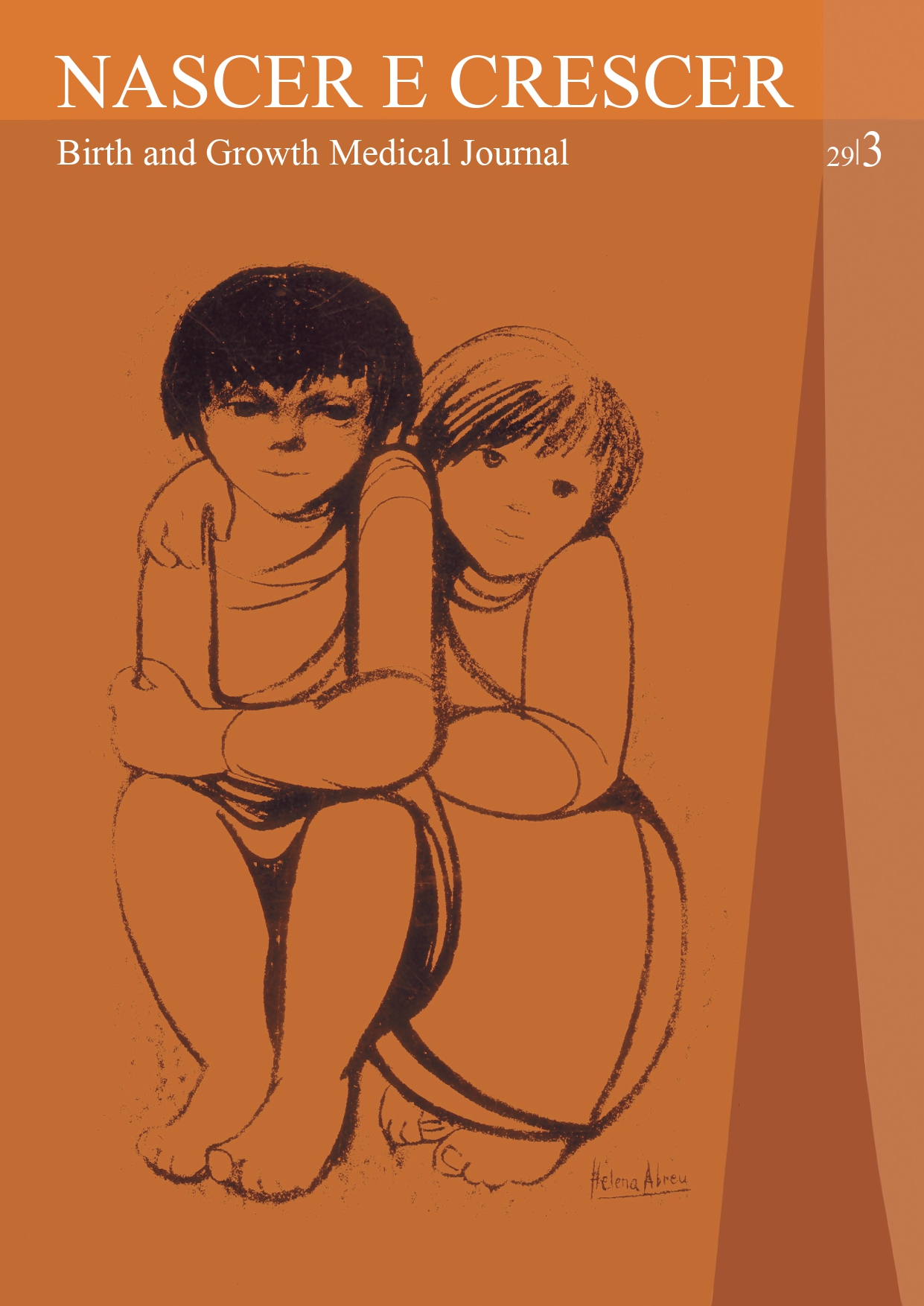Characterization of the population of pregnant women attending a mental health service
DOI:
https://doi.org/10.25753/BirthGrowthMJ.v29.i3.17113Keywords:
mental health, perinatal care, pregnancy, psychopathologyAbstract
Introduction: Psychopathological symptoms are common during pregnancy and their detection and referral to specialized care is often suboptimal. The aim of this study was to perform a descriptive analysis of sociodemographic, mental health, and obstetric features of a population of pregnant women followed at Psychiatry consultation.
Methodology: This was a cross-sectional, descriptive study of women followed both at Gynecology/Obstetrics and Psychiatry consultations of Hospital Prof. Doutor Fernando Fonseca between 2014 and 2016. A total of 76 women were included, for whom pre-defined features associated in the literature with risk of developing psychopathological symptoms during pregnancy were collected.
Results and Discussion: Risk factors identified in the development of depressive symptoms included absence of an affective relationship during pregnancy (n=11; 14.5%), being first-generation immigrant (n=17; 22.4%), and substance use before (n=18; 23.7%) or during (n=10; 13.1%) pregnancy. Sample was divided into women with previous Psychiatry follow-up who became pregnant (n=44; 57.9%) and women referred to Psychiatry consultation during pregnancy (n=32; 42.1%). In the second group, 18.8% (n=6) of referrals were from primary health care, being relevant to understand whether this represents an under-referral.
Prescription of 21 risk category D drugs was identified, alerting to the need of caution in pharmacological prescription and of considering non-pharmacological options (e.g., cognitive-behavioral therapy) for management of these cases.
Conclusions: Risk factors identified in this study represent an opportunity to optimize clinical practice and improve these patients’ follow-up.
Downloads
References
Vesga-Lopez O, Blanco C, Keyes K, Olfson M, Grant BF, Hasin DS. Psychiatric Disorders in Pregnant and Postpartum Women in the United States. Arch Gen Psychiatry. 2008; 65:805–15.
Esteves M. Doença mental na Gravidez. (Tese para obtenção de grau de Mestre em Medicina). Inst Ciências Biomédicas Abel Salazar - Univ do Porto. 2012.
Kingston D, Tough S, Whitfield H. Prenatal and Postpartum Maternal Psychological Distress and Infant Development : A Systematic Review. Psychiatry Hum Dev. 2012; 43:683-714.
Macedo AF, Pereira AT. Saúde mental perinatal. LIDEL, editor. Lisboa; 2014.
Ulrich F, Petermnan F. Consequences and Possible Predictors of Health-damaging Behaviors and Mental Health Problems in Pregnancy – A Review. Geburtshilfe Frauenheilkd. 2016; 76:1136–56.
NICE (National Collaborating Centre for Mental Health), Antenatal and Postnatal Mental Health: The NICE Guideline on Clinical Management and Service Guidance, The British Psychological Society & The Royal College of Psychiatrists. 2007.
Weinreb L, Byatt N, Moore Simas TA, Tenner K, Savageau JA. What Happens to Mental Health Treatment During Pregnancy? Women’s Experience with Prescribing Providers. Psychiatr Q. 2014; 85:349–55.
Byatt N, Simas T, Lundquist R, Johnson J, Ziedonis D. Strategies for improving perinatal depression treatment in North American outpatient obstetric settings. J Psychosom Obstet Gynecol. 2012; 33:143–61.
Kingston D, Austin MP, Heaman M, McDonald S, Lasiuk G, Sword W, et al. Barriers and facilitators of mental health screening in pregnancy. J Affect Disord. 2015; 186:350–7.
Kopelman R, Moel J, Mertens C, Stuart S, Arndt S, O’Hara M. Barriers to Care for Antenatal Depression. Psychiatr Serv. 2008; 59:429–32.
Maia T. Determinants of mother-baby relationship evaluated during pregnancy. (Tese para obtenção de grau de Doutor) Escola de Saúde Pública – Universidade Nova de Lisboa. 2014.
Instituto Nacional de Estatística 2015. Anuário Estatístico da Área Metropolitana de Lisboa, Edição de 2016.
Latif Z. The maternal mental health of migrant women. A Race Equality Foundation Briefing Paper. 2014.
Almeida, LM, Costa-Santos, C, Caldas, JP, Dias, S, Ayres-de-Campos, D. The impact of migration on women’s mental health in the postpartum period. Revista de Saúde Pública. 2016; 50(0).
Cook JL, Green CR, de la Ronde S, Dell CA, Graves L, Ordean A, et al. Epidemiology and Effects of Substance Use in Pregnancy. J Obs Gynaecol Can. 2017; 39:906–15.
Murphy-Eberenz K, Zandi P, March D, Crowe R, Scheftner W, Alexander M, et al. Is perinatal depression familial? J Affect Disord. 2006; 90:49–55.
Biaggi A, Conroy S, Pawlby S, Pariante C. Identifying the women at risk of antenatal anxiety and depression: A systematic review. J Affect Disord. 2016; 191:62–77.
Bassi M, Delle Fave A, Cetin I, Melchiorri E, Pozzo M, Vescovelli F, et al. Psychological well-being and depression from pregnancy to postpartum among primiparous and multiparous women. J Reprod Infant Psychol. 2017;35:183–95.
Sockol L, Battle C. Maternal attitudes, depression, and anxiety in pregnant and postpartum multiparous women. Arch Women’s Ment Heal. 2015;18:585–93.
Ferracini AC, Rodrigues AT, Visacri MB, Stahlschmidt R, Silva NMOD, Surita FG, et al. Potential Drug Interactions and Drug Risk during Pregnancy and Breastfeeding: An Observational Study in a Women’s Health Intensive Care Unit. Rev Bras Ginecol Obs. 2017;39:258–64.
Alwan S, Reefhuis J, Rasmussen S, Friedman J. Patterns of antidepressant medication use among pregnant women in a United States population. J Clin Pharmacol. 2011;51:264–70.
Chaudron L. Complex Challenges in Treating Depression During Pregnancy. Am J Psychiatry. 2013;170:12–20.
van Ravesteyn L, Lambregtse-van den Berg M, Hoogendijk W, Kamperman A. Interventions to treat mental disorders during pregnancy: A systematic review and multiple treatment meta-analysi. PLoS One. 2017;12:e0173397.
Downloads
Published
How to Cite
Issue
Section
License
Copyright and Authors' Rights
All articles published in Nascer e Crescer - Birth and Growth Medical Journal are Open Access and comply with the requirements of funding agencies or academic institutions. For use by third parties, Nascer e Crescer - Birth and Growth Medical Journal adheres to the terms of the Creative Commons License "Attribution - Non-Commercial Use (CC-BY-NC)".
It is the author's responsibility to obtain permission to reproduce figures, tables, etc. from other publications.
Authors must submit a Conflict of Interest statement and an Authorship Form with the submission of the article. An e-mail will be sent to the corresponding author confirming receipt of the manuscript.
Authors are permitted to make their articles available in repositories at their home institutions, provided that they always indicate where the articles were published and adhere to the terms of the Creative Commons license.


